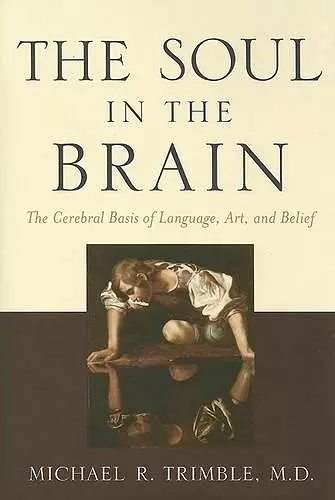The Soul in the Brain
The Cerebral Basis of Language, Art, and Belief
Format:Hardback
Publisher:Johns Hopkins University Press
Published:5th Jun '07
Currently unavailable, and unfortunately no date known when it will be back

Trimble elegantly and expertly surveys the literature on the neurologic correlates of changes in religious, esthetic, and poetic expression and then synthesizes what he has garnered from his reviews into a balanced and reasonable theoretical framework with which to understand these central facets of the human experience. -- Patrick McNamara, Boston University School of Medicine There have been a flurry of books recently on God and the brain, written either from the cold hard world of a neuroscientist or the more abstract but less brain-informed pulpit of a spiritual leader. Trimble tackles this most important topic with his unique knowledge and perspectives gained as a knowing and caring physician, a critical neuroscientist, a gifted historian, and a superb storyteller. He fuses these fields to address the simplest and most important questions: Why do we cry when we listen to music, or pay money to go and weep in the theater? This book is a remarkably new approach to understanding why we behave, think, and feel as we do. -- Mark S. George, Medical University of South Carolina To clarify the creative origins of poetry, music, and visual art requires polymathic erudition, and this is just what Michael Trimble is able to supply. The Soul in the Brain broadens the discussion of the evolutionary origins of language and plants it firmly in the brain. It deserves to be widely read. -- Timothy J. Crow, SANE Prince of Wales International Centre, University of Oxford In this latest book, Dr. Trimble incorporates his long experience with patients who have brain disorders, his thoughtful approach to neurological diseases, and his philosophical depth to take the reader on an exciting adventure examining the cerebral basis for the cultural beliefs we hold most dear. Those interested in neurology, psychiatry, and the relationship of these disciplines to culture will find this an exciting read and a 'must have' book. -- Jeffrey L. Cummings, University of California, Los Angeles Michael Trimble, consultant psychiatrist at the Institute of Neurology in London, is, in my view, today's outstanding student conceptualizing the relationship of the brain to those matters of human mental life expressed in creativity and life-force. He follows in the wake of previous psychiatrists to the National Hospital such as W.H.R. Rivers and Eliot Slater in bringing broad scholarship and wide-ranging interest to his daily work. Like them, he is a superb writer capable of making the most difficult of subjects clear, and his opinions are likewise coherent and compelling. But Trimble has the great advantage of being expert in contemporary techniques in brain imaging-all brought to the highest level of capacity at the National Hospital-that permit him to draw the fascinating ideas displayed here in this book on the human spirit. Here neuroscience, practical clinical experience, and deep thinking combine in an engrossing fashion. Everyone interested in the human mind-and who is not?-will find riches here for contemplation. -- Paul McHugh, The Johns Hopkins School of Medicine
With the sensitivity of a dedicated doctor and the curiosity of an accomplished scholar, Trimble offers an insightful analysis of how the study of people with paradigmatical neuropsychiatric conditions can be the cornerstone to unraveling some of the mysteries of the cerebral representations of our highest cultural experiences.In this provocative study, Michael R. Trimble, M.D., tackles the interrelationship between brain function, language, art-especially music and poetry-and religion. By examining the breakdown of language in several neuropsychiatric disorders, neuroscientists have identified brain circuits that are involved with metaphor, poetry, music, and religious experiences. Drawing on this body of evidence, Trimble argues that religious experiences and beliefs are explicable biologically and relate to brain function, especially of the nondominant hemisphere. Inspired by the writings and reflections of his patients-many of whom have epilepsy, psychosis, or affective disorders-Trimble asks how the human species, so enamored of its own logic and critical facilities, has held from the dawn of civilization strong religious beliefs and a reverence for the arts. He explores topics such as the phenomena of hypergraphia and hyper-religiosity, how religious experiences and poetic expression are neurologically linked with our capacity to respond to music, and how neuropsychiatric disorders influence behaviors related to artistic expression and religiosity by disturbing brain function. With the sensitivity of a dedicated doctor and the curiosity of an accomplished scholar, Trimble offers an insightful analysis of how the study of people with paradigmatical neuropsychiatric conditions can be the cornerstone to unraveling some of the mysteries of the cerebral representations of our highest cultural experiences.
This book exists... to explain matters of the heart using our knowledge of the mind... A host of professional students, clinicians, educators, and other well-read individuals will find this worthy of a close and careful read. -- Mark H. Fleisher JAMA 2007 Perfect for either college-level collections strong in science, health, or social science and for public lending collections alike... An intriguing, lively survey. Midwest Book Review 2007 A highly thought-provoking excursion. Scientific American Mind 2007 This scholarly, yet provocative, book from an insightful, observant neurologist... is rich with thought-provoking ideas. -- Chris McManus British Journal of Psychiatry 2008
ISBN: 9780801884818
Dimensions: 229mm x 152mm x 25mm
Weight: 567g
304 pages